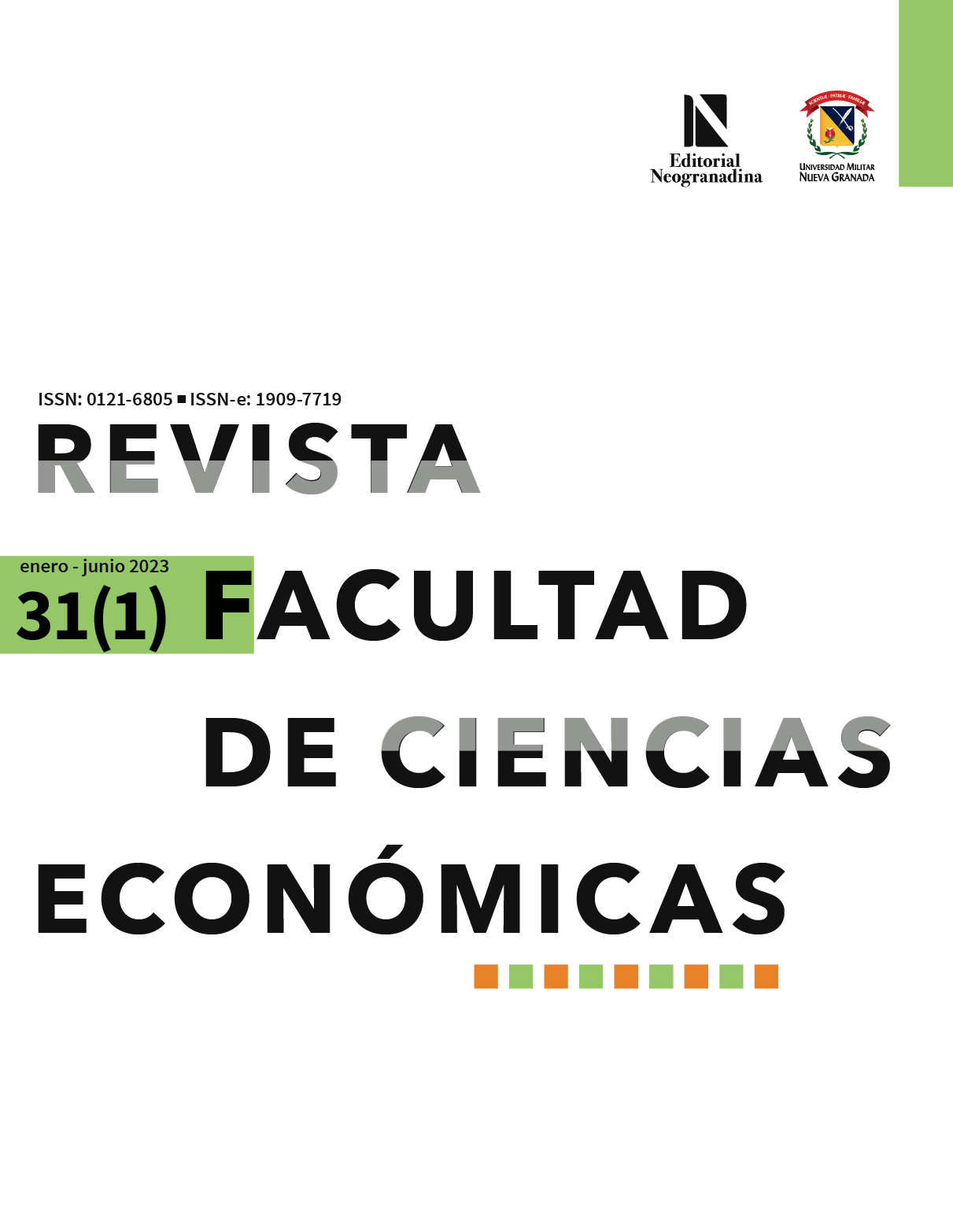Emprendimiento y género en el posconflicto
un análisis de las competencias emprendedoras de las mujeres víctimas
Resumen
En Colombia, después de cinco años de la firma del acuerdo de paz, es evidente que aún está en proceso el restablecimiento de la vida cotidiana de las víctimas de este conflicto. El emprendimiento se presenta como una herramienta que puede apoyar el empoderamiento económico que requiere esta población. Este artículo analizó los efectos de las competencias emprendedoras de las mujeres víctimas del conflicto armado en la probabilidad de crear un negocio. Para ello, este estudio utilizó un análisis descriptivo y empírico con base en los datos recolectados de mujeres que habitan los municipios de Buga y Tuluá en el Valle del Cauca, Colombia. Se identificó que las variables de asumir riesgos (resiliencia e iniciativa en la dimensión del saber ser),las de exploración de oportunidades (autonomía y trabajo en equipo en la dimensión de saber hacer) y todas las variables propuestas en la dimensión de saber conocer son significativas en la propensión a emprender.
Descargas
Referencias bibliográficas
Abdullah, N., Hadi, N. U., y Dana, L. P. (2018). The nexus between entrepreneur skills and successful business: a decompositional analysis. International Journal of Entrepreneurship and Small Business, 34(2), 249-265.http://https://doi.org/10.1504 / IJESB.2018.10013260
Aguirre, J. J., Orellana, B. S., Molina, A. P., y Gaona, L. B. (2016). Capacidad emprendedora desde la perspectiva de género. Opción, 32(81), 238-261.
Álvarez, A., y Valencia, P. (2008). Un análisis de los factores sociodemográficos determinantes en la creación de empresas en el marco de la interculturalidad. Revista de Economía Mundial, (18), 341-353.
Branicki, L., Sullivan-Taylor, B. y Livschitz, S. (2018). How entrepreneurial resilience generates resilient SMEs, International Journal of Entrepreneurial Behavior and Research, 24(7), 1244-1263. https://doi.org/10.1108/ijebr-11-2016-0396
Cabana-Villca, R., Cortes-Castillo, I., Plaza-Pasten, D., Castillo-Vergara, M., y Alvarez-Marin, A. (2013). Analysis of potential entrepreneurial skills and effective students at higher education. Journal of Technology Management and Innovation, 8(1), 65-75.https://doi.org/10.4067/s0718-27242013000100007
Chatterjee, N., Das, N., y Srivastava, N. K. (2019). A structural model assessing key factors affecting women's entrepreneurial success: Evidence from India. Journal of Entrepreneurship in Emerging Economies, 11(1), 122-151.https://doi.org/10.1108/JEEE-08-2016-0030
Chew, L., Hoe, L., Kim, T. y Wan, L. (2016). Self-perceived entrepreneurship skills for undergraduates of a private university in Malaysia. American Journal of Applied Sciences, 13(6), 715-725 https://doi.org/10.3844/ajassp.2016.715.725
Cifuentes, C. A., Gutiérrez, S. T. y Hoyos, A. (2021). Efecto de las condiciones institucionales en el emprendimiento: caso de estudio de la población víctima en posconflicto. Revista Lumen Gentium, 5(2), 40-59. https://revistas.unicatolica.edu.co/revista/index.php/LumGent/article/view/356/200
https://doi.org/10.52525/lg.v5n2a7
Costa, J., y Pita, M. (2020). Appraising entrepreneurship in Qatar under a gender perspective. International Journal of Gender and Entrepreneurship, 12(3), 233-251.https://doi.org/10.1108/IJGE-10-2019-0146
Cutura, J. (2008). Voices of women entrepreneurs in Bosnia and Herzegovina. The World Bank. https://www.ifc.org/wps/wcm/connect/topics_ext_content/ifc_external_corporate_site/sustainability-at-ifc/publications/publications_report_voiceswomen-bosniaherzegovina__wci__1319578524915
Davidsson, P. y Honig, B. (2003). The role of social and human capital among nascent entrepreneurs. Journal of Business Venturing, 18(3), 301- 331. https://doi.org/10.5465/apbpp.2000.5438611
Elmuti, D., Khoury, G., y Omran, O. (2012). Does entrepreneurship education have a role in developing entrepreneurial skills and ventures' effectiveness? Journal of Entrepreneurship Education, 15, 83.
Fernandes, J., Afonso, P., Fonte, V., Alves, A. y Ribeiro, N. (2017). Promoting entrepreneurship among informatics engineering students: insights from a case study. European Journal of Engineering Education, 42(1), 91-108,https://doi.org/10.1080/03043797.2016.1197891.
Formichella, M. (2008). Educación y trabajo independiente: un aporte a la evidencia empírica. Estudios de Economía Aplicada, 26(3), 115-139.https://doi.org/10.25115/eea.v26i3.5674
Gadar, K., y Yunus, N. K. Y. (2009). The influence of personality and socio-economic factors on female entrepreneurship motivations in Malaysia. International Review of Business Research Papers, 5(1), 149-162.
Gómez, M. P., y Satizábal, K. (2011). Educación en emprendimiento: Fortalecimiento de competencias emprendedoras en la Pontificia Universidad Javeriana Cali. Economía Gestión y Desarrollo, (11), 11-121. https://www.researchgate.net/publication/227385852_Educacion_en_emprendimiento_fortalecimiento_de_competencias_emprendedoras_en_la_Pontificia_Universidad_Javeriana_Cali
Greenberg M. E. y Zuckerman E. (2009). The Gender Dimensions of Post-Conflict Reconstruction: The Challenges in Development Aid. En Addison T., Brück T. (eds) Making Peace Work. Studies in Development Economics and Policy (pp. 6-33). Palgrave Macmillan, London. https://doi.org/10.1057/9780230595194_6
Hoyos, A., Gutiérrez, S. T. y Cifuentes, C. A. (2020). Emprendimiento y posconflicto: el efecto de los factores sociodemográficos en el emprendimiento de las víctimas del conflicto armado en Buga y Tuluá (Valle del Cauca, Colombia).
Kargwell, S. (2012). A comparative study on gender and entrepreneurship development: Still a male's world within UAE cultural context. International Journal of Business and Social Science, 3(6), 44 - 55.
Kelly, D., Baumer, B., Brush, C., Greene, P., Mahdavi, M., Majbouri, M., Cole, M., Dean, M. y Heavlow, R. (2017). Women's entrepreneurship 2016/2017 report. Global Entrepreneurship Research Association. http://gemconsortium.org/
Krauss, C. (2005). Las actitudes Emprendedoras en los Estudiantes de la Universidad Católica del Uruguay. Revista FCE, 9(1), 28 - 41.
Lashgarara, F., Roshani, N., y Najafabadi, M. O. (2011). Influencing factors on entrepreneurial skills of rural women in Ilam City, Iran. African Journal of Business Management, 5(14), 5536-5540.
Malecki, E. J. (2018). Entrepreneurs, Networks, and Economic Development: A Review of Recent Research. En J. A. Katz. y A. C. (Ed.) Reflections and Extensions on Key Papers of the First Twenty-Five Years of Advances (Advances in Entrepreneurship, Firm Emergence and Growth, 20) (pp. 71-116). Emerald Publishing Limited, Bingley.https://doi.org/10.1108/S1074-754020180000020010
Mauer, R., Neergaard, H. y Linstad, A. K. (2017). Self-efficacy: conditioning the entrepreneurial mindset. En Brännback M. and Carsrud A. (Eds), Revisiting the Entrepreneurial Mind (pp. 293-317). International Studies in Entrepreneurship.https://doi.org/10.1007/978-1-4419-0443-0_11
Mendoza, J. (2017). Influencia de las características sociodemográficas individuales en la creación de negocios en Perú. Semestre Económico, 20(43), 37-60.https://doi.org/10.22395/seec.v20n43a2
Méndez-Picazo, M., Galindo-Martín, M. y Ribeiro-Soriano, D. (2012). Governance, Entrepreneurship and Economic Growth, Journal of Entrepreneurship and Regional Development, 24(10), 865-877. https://doi.org/10.1080/08985626.2012.742323
Nga, J. K. H. y Shamuganathan, G. (2010). The influence of personality traits and demographic factors on social entrepreneurship start up intentions. Journal of business ethics, 95(2), 259-282. https://doi.org/10.1007/s10551-009-0358-8
Ordóñez, D. Y., Castillo, A. M. y Rodríguez, I. M. (2021). Empoderamiento de la mujer en el emprendimiento y la innovación. Población y Desarrollo, 27(52), 69-91. https://doi.org/10.18004/pdfce/2076-054x/2021.027.52.069
Osorio, G., Saavedra, R., y Martínez, G. (2019). El impacto institucional en el emprendimiento de México. Revista de Estudios Empresariales. Segunda época, (1), 98-115. https://doi.org/10.17561/ree.v2019n1.6
Ovalles-Toledo, L. V., Freites, Z. M., Urbina, M. Á. O., y Guerra, H. S. (2018). Habilidades y capacidades del emprendimiento: un estudio bibliométrico. Revista Venezolana de Gerencia, 23(81), 217-234.
Pachón, M. L (2020). Construcción y aplicación de un instrumento para medir competencias emprendedoras. Un caso empírico. Universidad EAN. http://hdl.handle.net/10882/9605.
Palazzechi, L., Bucci, O. y Di Fabio, A. (2018). High entrepreneurship, leadership, and professionalism (HELP): a new resource for workers in the 21st century. Frontiers in Psychology, 9, 1-8.https://doi.org/10.3389/fpsyg.2018.01480
Portuguez, M. y Gomez, M. (2020). Training needs for successful businesswomen: a narrative analysis of stories of women entrepreneurs. International Journal of Entrepreneurship and Small Business, 1(1).https://doi.org/10.1504/ijesb.2020.10032635
Portuguez, M., Ross, C. y Gómez, M. (2020). Entrepreneur profile and entrepreneurship skills: expert's analysis in the Mexican entrepreneurial ecosystem, International Conference on Technology and Entrepreneurship - Virtual (ICTE-V), San Jose, CA, 1-6,https://doi.org/10.1109/ICTE-V50708.2020.9114372.
Rambe, P., Ndofirepi, T. M., y Dzansi, D. (2017). Shaping the Entrepreneurship Intentions of Students: The Role of Education and Technological Creativity. En European Conference on Innovation and Entrepreneurship (pp. 537-547). Academic Conferences International Limited.
Samadi A.H. (2018). Institutions and Entrepreneurship in MENA Countries. In: N. Faghih y M. Zali (eds) Entrepreneurship Ecosystem in the Middle East and North Africa (MENA). Contributions to Management Science. Springer, Cham. https://doi.org/10.1007/978-3-319-75913-5_3
Santos, S. C., Caetano, A., Costa, S.A., Rueff Lopes, R., Silva, A. y Neumeyer, X. (2020). Uncovering the affective turmoil during opportunity recognition and exploitation: a nonlinear approach, Journal of Business Venturing Insights, 14, 1-12, https://doi.org/10.1016/j.jbvi.2020.e00184.
Sestic, M., y Ibrahimagic, S. (2015). Business problems in a women's small entrepreneurship-the Bosnia and Herzegovina case of post conflict and transition context. En Vrankic, I., Kozina, G. y Kovsca, V. (Eds.). Economic and Social Development, 9th International Scientific Conference, Book of Proceedings, 491. https://www.esdconference.com/upload/book_of_abstracts/Book%20of%20Abstracts_Istanbul_2015_Final.pdf
Shakeel, M., Yaokuang, L., y Gohar, A. (2020). Identifying the Entrepreneurial Success Factors and the Performance of Women-Owned Businesses in Pakistan: The Moderating Role of National Culture. SAGE Open, 1 - 17.https://doi.org/10.1177/2158244020919520
Shatri, V., y Merovci, S. (2015). Woman entrepreneurs in Kosovo. In Vrankic, I., Kozina, G. y Kovsca, V. (Eds.). Economic and Social Development, 9th International Scientific Conference, Book of Proceedings (pp. 513-528). https://www.esdconference.com/upload/book_of_abstracts/Book%20of%20Abstracts_Istanbul_2015_Final.pdf
Sørensen, B. (1999). Women and Post-Conflict Reconstruction: Issues and Sources. Social Change, 29(3-4), 333-333. doi:10.1177/004908579902900423
Srivastava, S. y Misra, R. (2017). Exploring antecedents of entrepreneurial intentions of young women in India: A multi-method analysis. Journal of Entrepreneurship in Emerging Economies, 9(2), 181-206.https://doi.org/10.1108/JEEE-04-2016-0012
Stewar, W. H., y Roth, P. L. (2001). Risk propensity difference between entrepreneurs and manager: A meta- analytic review. Journal of Applied Psychology, 86(1), 145-153. https://doi.org/10.1037/0021-9010.86.1.145
Suparno, A. y Santono, A. (2018). Entrepreneurship education and its influence on financial literacy and entrepreneurship skills in college. Journal of Entrepreneurship Education, 21(4), 1-11.
Upreti, BR, Ghale, Y. y KC, S. (2016). Effects of armed conflict on agricultural markets and post-conflict engagement of women in export-led agriculture in Nepal. Journal of International Women's Studies, 18(1), 156-180. http://vc.bridgew.edu/jiws/vol18/iss1/12
Urbano, D. y Alvarez, C. (2014). Institutional dimensions and entrepreneurial activity: an international study. Small business economics, 42(4), 703-716. https://doi.org/10.1007/s11187-013-9523-7
Wooldridge, J. M. (2009). Introducción a la econometría: un enfoque moderno. Cencage Learning.

Derechos de autor 2023 Revista Facultad de Ciencias Económicas

Esta obra está bajo una licencia internacional Creative Commons Atribución-NoComercial-SinDerivadas 4.0.











